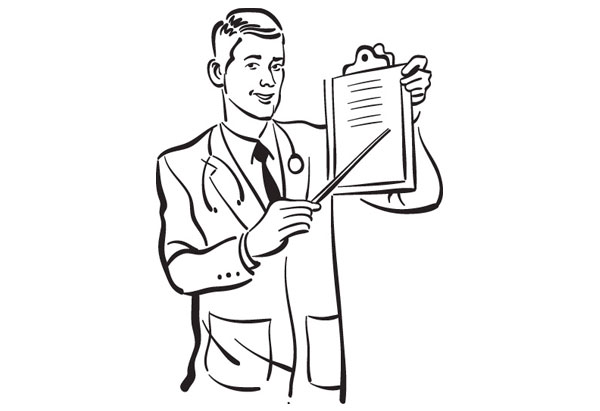Doctor-to-English Dictionary
This helpful glossary is the antidote to confusing medical speak.

Illustration: Kagan McLeod
Alexithymia (n.)
An inability to express emotion verbally.
The problem is common among people in pain, but a 2010 study found that treating it with psychotherapy can actually help reduce the sensation of pain.
Brown fat (n.)
A type of fat that burns calories rather than storing them.
Researchers in Germany have found an enzyme that triggers development of this tissue in mice. They believe it could one day be a powerful weight loss aid.
Bruxism (n.)
Teeth grinding.
Research suggests it can be a side effect of SSRIs, antidepressants that indirectly suppress the neurotransmitter dopamine, which plays a role in controlling motor activity.
Central governor theory (n.)
The idea that while you're exercising, your brain triggers fatigue signals well before your muscles run out of energy, to trick your body into slowing down.
By incrementally pushing past your perceived limit, you can train your brain to allow more access to your reserves.
Dieter's paradox (n.)
A belief in "negative" calories.
New research finds that dieters tend to perceive meals with a healthy option (like chili and a salad) as having fewer calories than the unhealthy option alone (just chili).
Fullness resistance (n.)
A reduced sensitivity to the biological signals that cue satiety.
People with this condition can overeat. Louis Aronne, MD, suggests consuming filling foods (high in lean protein, water, and fiber) before fattening ones.
Genoeconomics (n.) The study of how DNA affects financial decision making.
It may one day be possible to medically treat poor spending habits.
Green exercise (n.)
The term used by researchers to describe physical activity outdoors.
A recent review of studies found that just five minutes boosted subjects' self-esteem scores on a standardized scale. Workouts near water had the largest effect.
Human biometeorology (n.)
The study of how weather affects health.
Sign up at mediclim.com to get alerts about atmospheric conditions that affect such ailments as arthritis, migraine, diabetes, and heart disease.
Iceberg belief (n.)
A deeply held, "frozen" principle (such as "Asking for help shows weakness") that often causes overreactions.
The military is training soldiers to identify these beliefs to help them better negotiate combat and interpersonal situations.
Inattentional blindness (n.)
The failure to see something in plain sight because your attention is elsewhere.
A 2009 study found that people walking and talking on a cell phone were less likely to notice a unicycling clown in their midst.
An inability to express emotion verbally.
The problem is common among people in pain, but a 2010 study found that treating it with psychotherapy can actually help reduce the sensation of pain.
Brown fat (n.)
A type of fat that burns calories rather than storing them.
Researchers in Germany have found an enzyme that triggers development of this tissue in mice. They believe it could one day be a powerful weight loss aid.
Bruxism (n.)
Teeth grinding.
Research suggests it can be a side effect of SSRIs, antidepressants that indirectly suppress the neurotransmitter dopamine, which plays a role in controlling motor activity.
Central governor theory (n.)
The idea that while you're exercising, your brain triggers fatigue signals well before your muscles run out of energy, to trick your body into slowing down.
By incrementally pushing past your perceived limit, you can train your brain to allow more access to your reserves.
Dieter's paradox (n.)
A belief in "negative" calories.
New research finds that dieters tend to perceive meals with a healthy option (like chili and a salad) as having fewer calories than the unhealthy option alone (just chili).
Fullness resistance (n.)
A reduced sensitivity to the biological signals that cue satiety.
People with this condition can overeat. Louis Aronne, MD, suggests consuming filling foods (high in lean protein, water, and fiber) before fattening ones.
Genoeconomics (n.) The study of how DNA affects financial decision making.
It may one day be possible to medically treat poor spending habits.
Green exercise (n.)
The term used by researchers to describe physical activity outdoors.
A recent review of studies found that just five minutes boosted subjects' self-esteem scores on a standardized scale. Workouts near water had the largest effect.
Human biometeorology (n.)
The study of how weather affects health.
Sign up at mediclim.com to get alerts about atmospheric conditions that affect such ailments as arthritis, migraine, diabetes, and heart disease.
Iceberg belief (n.)
A deeply held, "frozen" principle (such as "Asking for help shows weakness") that often causes overreactions.
The military is training soldiers to identify these beliefs to help them better negotiate combat and interpersonal situations.
Inattentional blindness (n.)
The failure to see something in plain sight because your attention is elsewhere.
A 2009 study found that people walking and talking on a cell phone were less likely to notice a unicycling clown in their midst.
As a reminder, always consult your doctor for medical advice and treatment before starting any program.



